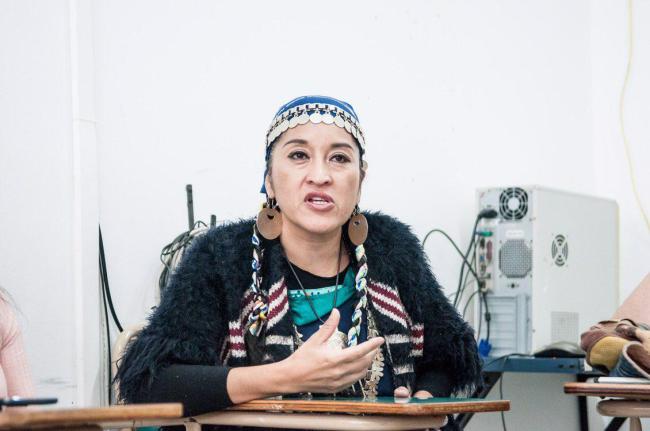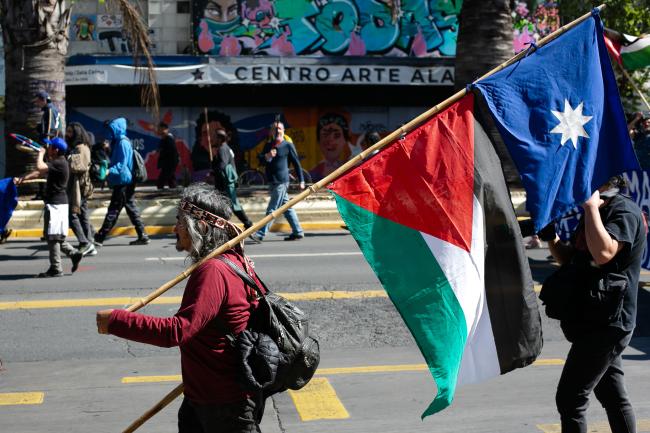
This letter was originally published in Spanish and other languages on the author's blog and in Spanish by Presentes. Translated by Karina Gamez.
Dear Palestinian sister, I am writing from very distant lands, from my territory of Puelmapu, Mapuche Territory, in southern Patagonia, under the administration of the Argentine state.
I am the daughter of a nation that is also under invasion, the Mapuche nation, a people who still remember their days of freedom, when we traveled without borders and without wires on our Wallj Mapu. Like your people, beloved sister, mine also know the injustice of dispossession, the pain of genocide, the desolation of being slaves in our own lands, the deportations of death, the forced relocations.
We have felt the world’s apathy, and even today we suffer the imposition of two colonial states, Argentina and Chile, which continue to persecute, imprison, and murder us. My family has miraculously survived concentration camps, torture, and extermination. That is where I come from, a lineage rooted in the depths of the earthly memory of these territories, a courageous Indigenous nation full of dignity.
The Palestinian people have inhabited my heart for a few years, ever since I learned that there, in the distant and yet so close Middle East, a story similar to ours was unfolding: an original people, the Palestinian people, invaded by a colonial state, Israel. A situation so similar to ours with a difference of a few decades, since the Argentine state ended its genocidal campaign at the end of the 1800s but its state definitively settled in Puelmapu in the early 1900s.
Every bullet that kills the lives of my Palestinian sisters and brothers pierces my body. I relive the genocide with every bomb that falls on Gaza, with every child killed. The death of innocents spreading across the Palestinian territory, at the hands of the Israeli state.
I have received from my elders a very, very old teaching in the philosophy of my Mapuche people, our kuifikimvn. They talk about the yerpun, going through the night, to be a person, elevating our being as humanity. We must go through obstacles, pains, deep sorrows, go through the darkest night to dawn a new day, bright and full.

I wonder: When will we get through the night? What has happened to the Jewish people, who also had their long and deep night? Did they stay in the dark? Or have they been kidnapped by those who rule the nights, inoculating the worst nightmares? Perhaps the monsters of the night have taken control of the world, numbing our senses, with sleeping pills loaded with lies. We will have a lot of yerpun, beloved sister. But sooner rather than later, the earthly peoples will get through the night, and the colonial military forces will have to surrender in the face of the unity of the peoples. They will have to surrender to the solidarity and the strength of the justice and sisterhood of a humanity that in all corners of the world will continue to take to the streets, convinced that as long as there is no justice for the criminals, there will be no peace.
The occupying forces have always acted by launching a propaganda apparatus that silences the conscience of the peoples, that justifies their abhorrent crimes to the world. The colonial narrative begins with the branding of the victims as terrorists, and the terrorist states as enactors of justice.
The Mapuche nation knows very well that perverse tale, which works for the oppressors because the vast majority of the world’s population does not question the racism structuring the doctrine of hateful democracies.
A small portion of humanity that concentrates power is supremacist, racist, and has decided that the lives of racialized peoples do not matter. I know that a part of the Jewish population is repressed by the tyranny of the genocidaires who govern the state of Israel. I know that Jewish women and men have courageously raised their voices to shout their rage and make it clear that they will not allow a people to continue to be murdered in their name.
Many of these brave people have suffered mistreatment, torture, and confinement by the repressive forces of the ultra-right Zionist and fascist Israeli government. That fraction of anti-Zionist Jewish sisters and brothers are persecuted for feeling and bearing their deep humanity, ashamed of the murderers who claim to represent them. I also extend my embrace to them. They remind me of the Argentines who bravely went out to denounce the state together with the Mapuche people when the bullets of the Argentine forces were fired at our children, just a year ago. Of course, the repudiation of that hunt for Mapuche children and women was not massive—just a handful of conscientious and supportive beings. There will always be a voice that emerges wisely and courageously to say “enough!”
These days, I think of Hannah Arendt, Jewish, Zionist, and yet persecuted and hated by her own, who did not allow her revisionism, criticisms, and interpellations in the face of a colonial and racist nationalism that proclaimed itself as cruel as her Nazi persecutors. She could see what that political force would become, sustaining a bloody and cruel occupation by force.
I wish so much, beloved Palestinian sister, that the women of the world would join together in a call for a global strike against genocide, to stop the war. Perhaps it will work to stop the world. And those who profit from the war, the true beneficiaries of this massacre, would know that we are determined to take back our right to justice and peace.
I firmly believe in our strength, in our capacity to build consensus, in our discernment to see above all differences the importance of sustaining life. My dear Palestinian sister, I embrace your people with all my being, full of love. I am ashamed of my limitations and impotence in the face of what you are all going through. Believe me, I wish I was there helping. As a Mapuche woman, I know what it is like to be deprived of everything, and how wonderful it is when in the midst of distress a helping hand reaches out with the support we need.
I desire the freedom of your people as much as I dream of the freedom of mine. Weayiñ lamngen Palestine. We will win, sister Palestine. From the southern Puelwillimapu mountain range, for territory, justice, and freedom, marici weu!
Moira Millán is a Mapuche weychafe, author, and activist from the lands known as Argentina.

